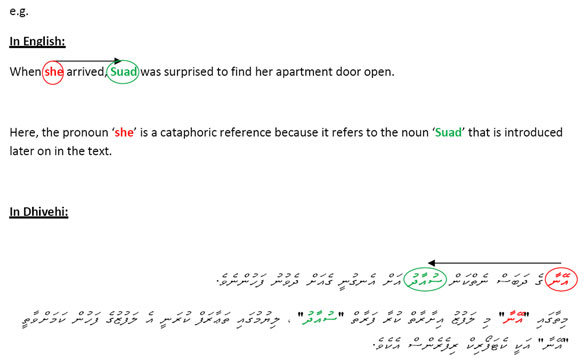Think about the following situation:
You see a man snatch a lady’s bag and run. You chase the man and when you catch him you hold his hands behind his back and say, ‘You are under arrest’.
Would the man consider himself under arrest? Why?
Another example:
If I were to say:
‘s of now, I declare the Maldives a kingdom!’
or
‘I will reduce enrollment fees for BA TEFL next year’
or
‘ou must submit the next assignment tomorrow’
Now think about this:
Fareeda often borrows books from people but never return them. When people ask her to bring back their books, she promises to do so soon but never does. After a few weeks she (conveniently) forgets that she did borrow a book from that person. Not knowing this, Ashfa lent her a book a week ago. Since then you have been asking her for the book almost every day (with little success!).
Ashfa: Fareeda, I need the book you borrowed. When will you return it?
Fareeda: book? which one?
Ashfa: Oh come on! The one on pragmatics that you borrowed form me last week. Don’t tell me you’ve misplaced it!
Fareeda: Oh that one! … no no I have not misplaced it. I have it at home. I will bring it to class tomorrow.
Another situation:
You are standing by the entrance to Ameenee Building, waiting for a friend. Someone comes and parks a huge truck in front of the building, blocking the entrance completely. The driver gets out and walks away. When the security guard comes out you are the only one standing near the truck. The Guard says to you, ‘Please move the truck’.
Obviously there are conditions for speech act to be effective.
Only certain people (often in certain circumstances) under particular conditions can say something and expect it to have an effect.
These conditions that need to be met in order for a speech act to be effective are known as felicity conditions.
e.g.
felicity conditions for an order are:
1. the sender believes the action should be done.
2. the receiver has the ability to do the action
3. the receiver has the obligation to do the action
4. the sender has the right to tell the receiver to do the action
Loosely speaking, felicity conditions can be divided into 3 types:
i. preparatory conditions
ii. conditions for execution
iii. sincerity conditions
Preparatory conditions
Preparatory conditions include factors such as the status or authority of the speaker to perform the speech act, the situation of other parties.
The situation of the utterance is important.
e.g.
In a soccer match, only the officiating referee can offer a penalty; one of the assistant referees (who are also qualified referees) cannot do so.
Conditions for execution
Conditions for execution are often exaggerated. Ritual or ceremonial actions accompanying certain speech act are so ingrained in our minds that we sometimes believe the act is invalidated, if the action is lacking – but there are few real examples of this.
Sincerity Conditions
Simple speaking these show that the speaker actually intends what s/he says. Like in the case for apologizing or promising, it is often impossible for others to determine whether or not sincerity conditions are fulfilled.
However there are some speech acts (e.g. finalizing a contract/deal) where this sincerity is determined by the presence of witnesses; so that one (or more) of the parties cannot later claim that they didn’t really mean it.
CONVERSATIONAL IMPLICATURE
In his series of lectures at Harvard University in 1967, Grice also outline an approach to what he termed ‘conversations implicature’.
Grice defines conversational implicature as the way in which hearers understand the complete message even when a speaker means more than exactly what they say.
e.g
‘Do you have some areca nut?’
What does the speaker want the hearer to understand from this?
The conversational implicature is a message that is not explicitly stated within the utterance. The speaker implies it. Grice proposed that the hearer is able to infer the intended message because they understand three things:
i. The usual linguistic meaning of what is said.
ii. Contextual information (shared or general knowledge).
iii. The assumption that the speaker is obeying the cooperative principle.

